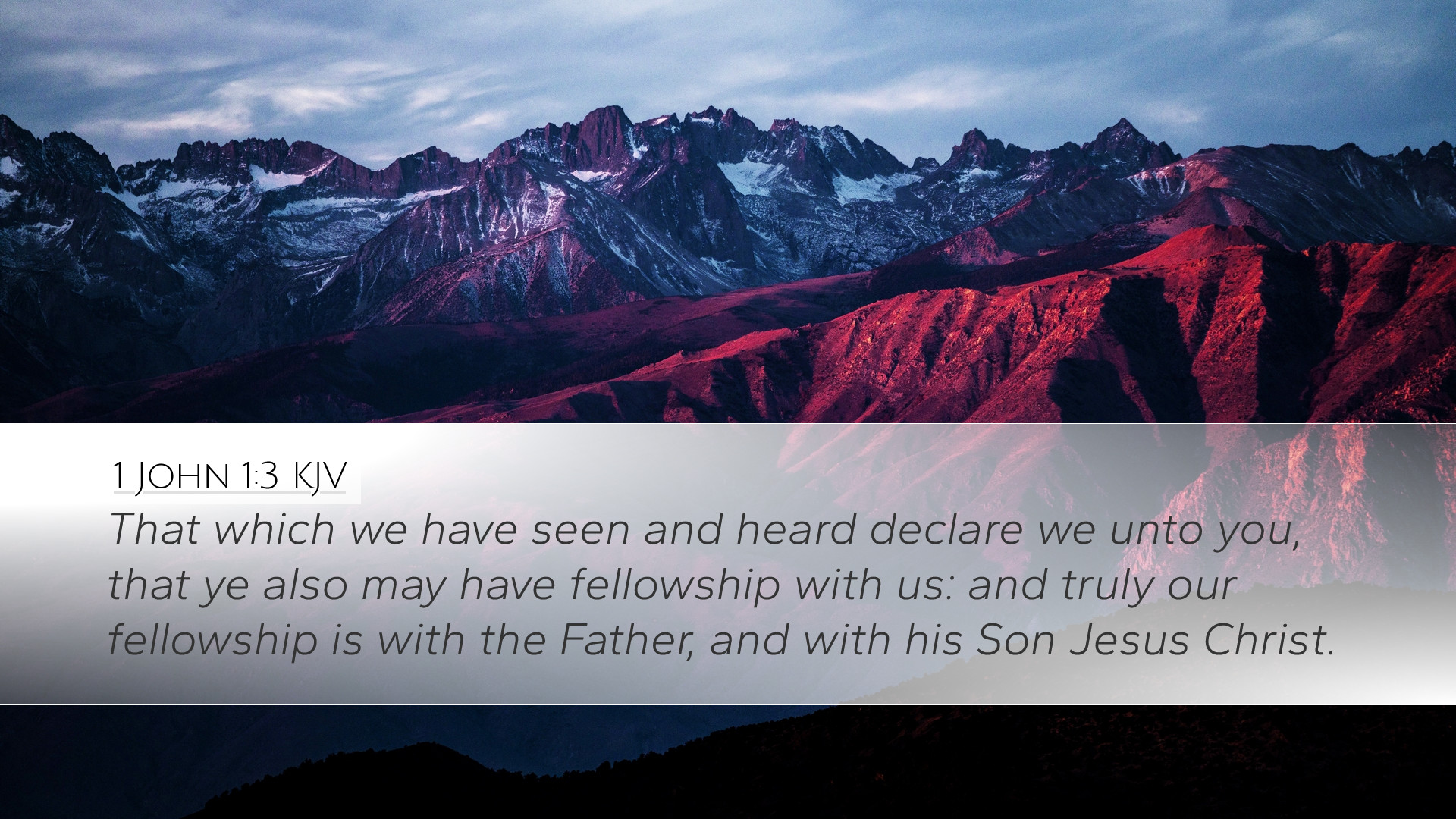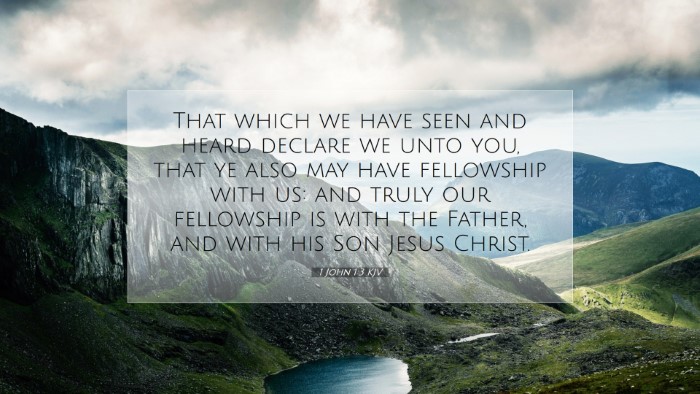Old Testament
Genesis Exodus Leviticus Numbers Deuteronomy Joshua Judges Ruth 1 Samuel 2 Samuel 1 Kings 2 Kings 1 Chronicles 2 Chronicles Ezra Nehemiah Esther Job Psalms Proverbs Ecclesiastes Song of Solomon Isaiah Jeremiah Lamentations Ezekiel Daniel Hosea Joel Amos Obadiah Jonah Micah Nahum Habakkuk Zephaniah Haggai Zechariah Malachi1 John 1:3
1 John 1:3 KJV
That which we have seen and heard declare we unto you, that ye also may have fellowship with us: and truly our fellowship is with the Father, and with his Son Jesus Christ.
1 John 1:3 Bible Commentary
Commentary on 1 John 1:3
"That which we have seen and heard declare we unto you, that ye also may have fellowship with us: and truly our fellowship is with the Father, and with his Son Jesus Christ."
Introduction
This verse encapsulates the profound purpose of John’s epistle, emphasizing the themes of fellowship, revelation, and the foundational truths about Christ. The Apostle John, writing towards the latter part of the first century, addresses both believers and seekers, intending to affirm and deepen their relationship with God through Christ.
Verse Breakdown
- “That which we have seen and heard”:
John establishes his firsthand experience with Christ. This emphasis on personal witness strengthens his authority and validity as an apostolic teacher.
- “declare we unto you”:
This declaration is an intentional act amidst a backdrop of false teachings and Gnostic ideologies that questioned the physical reality of Christ.
- “that ye also may have fellowship with us”:
John desires not only to communicate the truth but also to invite his readers into a communal relationship—“fellowship”—with him, other believers, and ultimately with God.
- “truly our fellowship is with the Father, and with his Son”:
This highlights the divine source of fellowship, pointing to the triune nature of God. John seeks to remind believers that genuine Christian fellowship is rooted in their shared relationship with God.
Theological Insights
In this verse, several critical theological themes emerge:
- The Nature of Fellowship:
Fellowship in Christian theology is not merely about communal activities but is an experiential relationship with God and fellow believers. This is further emphasized in the writings of Matthew Henry, who notes that true fellowship must be characterized by mutual participation in the life of the Father and the Son.
- The Importance of Witness:
Albert Barnes emphasizes the necessity of witnessing one’s faith. John’s insistence on sharing what he has experienced brings to light the essential nature of testimony in cultivating faith amongst believers.
- Christ’s Divinity and Humanity:
Adam Clarke points out that John's assertion reinforces the dual reality of Christ’s nature. The reality of Christ—seen and heard—validates the truth of His incarnation and underscores the significance of both His life and teachings.
Practical Applications
- The Call to Fellowship:
Pastors and church leaders are urged to foster genuine fellowship within their communities, reflecting the relational aspect of the Gospel message. This means creating environments where believers can experience and share their faith together.
- Emphasis on Testimony:
Each believer is encouraged to share their personal testimonies, drawing on the witness of their journeys with Christ. This can serve to strengthen the faith of others and invite new believers into the fold.
- Focus on the Trinity:
In theological discussions, an awareness of the relationship among the Father, Son, and Holy Spirit should inform believers' understanding of their own relational dynamics within the church context.
Conclusion
1 John 1:3 serves as a reminder that the Christian faith is rooted in both community and divine relationship. John’s call to declare what has been experienced underlines the essential nature of testimony and fellowship in the life of the church. As we engage with this text, let us remember that our message is not simply doctrinal; it is deeply experiential and relational—a shared journey leading to a closer walk with God.


